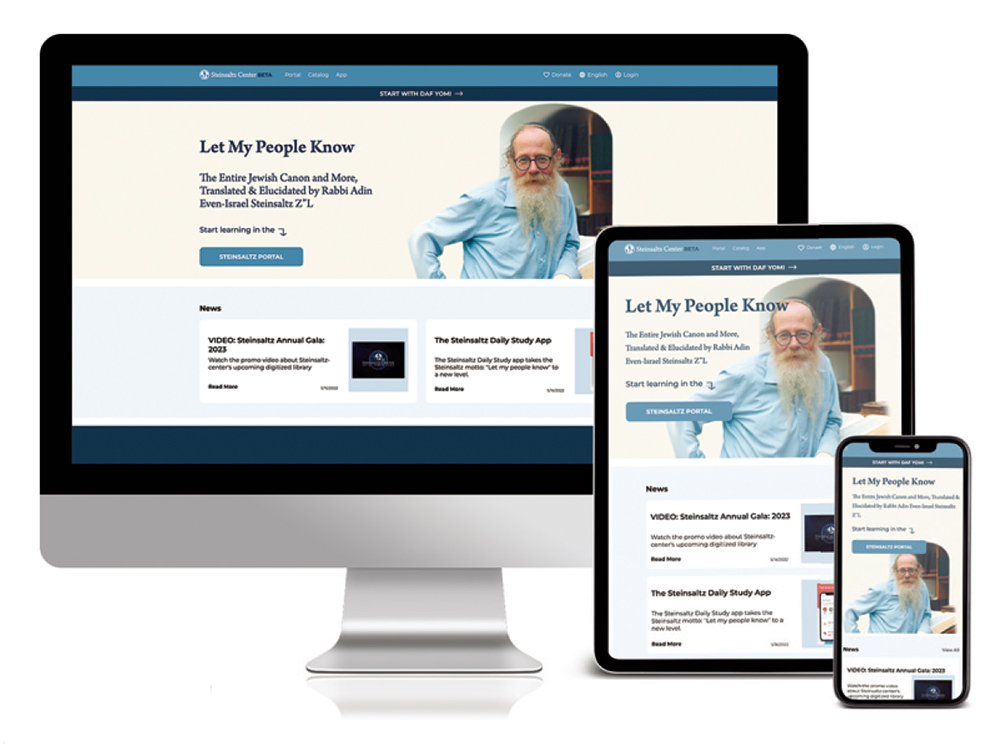
Rav Adin Even-Israel Steinsaltz was a man of many hats—rabbi, teacher, school principal, philosopher, prolific author and publisher—who left an indelible mark on our world. A modern day renaissance man, his authorship eventually extended to the Talmud, mysticism, philosophy, sociology and historical biography.
Rav Steinsaltz firmly believed in every Jew’s right to own their inheritance. For the Torah to be studied by growing numbers of Jews, he taught, we have to figure out better ways to transmit it in a rapidly changing world. In 1965, he founded the Israel Institute for Talmudic Publications, where the Gemara was translated into Hebrew, English, French, Spanish and Russian. Each project brought many classics—from the basic to the esoteric—to the Jewish bookshelf. His kabbalistic “The Thirteen Petalled Rose,” published in 1980, has been translated into eight languages, and has sold 300,000 copies worldwide.
Like a Torah text where the protagonist’s name alludes to his essence, there is a compelling duality in his name. Stein, Yiddish for stone (even was added later), indicates the “human Rosetta stone” he would become; after all, even native Israelis might struggle with the inscrutable Hebrew found in even the most basic texts, such as the Prophets. And, he had a gentle (adin) personality, with a passion for teaching and an affinity for translation and commentary.
A teacher who sees his students’ challenges, is reminiscent of Hillel, the Talmudic sage renowned for his accessibility and patience 2,000 years ago. Coincidentally, Hillel was also the catalyst for making Torah learning accessible to the average man. His obstacle was the beit midrash entrance fee. One wintry day, he could not afford to get in, so he climbed up to the skylight for the daily lecture. It started to snow, and some time later the rabbis inside looked up and saw a man covered in snow above their heads. They thawed him out, and eventually, other sages did the same for their entrance policy; anyone who wished to study could now come and learn Torah.
To teach, you have to really see the person and their context. Rav Adin believed that everyone is naturally curious, but you have to remove any friction—whether pressure or condescension—that stops them from achieving literacy in their own heritage. This understanding, and his “see everything through the prism of Torah’’ perspective, pushed him to take on the task, intentionally including photographs and historical tidbits in his Gemara to spark interest. He sent the invitation, and wisdom-seeking Jews from all over the world accepted it. Today, the Steinsaltz Center, which distributes Rav Adin’s works, is remaking this invitation for a new generation. Today, it is about accessibility, portability, motivation … and so much more.
The Steinsaltz Center has launched an attractive, user-friendly app that gives the solo learner foundational sifrei kodesh and multiple options for daily study cycles on their devices. Tanach, Mishnah, Gemara, Rambam and Tanya sit in the Library section. (The monumental Mishnah and Rambam projects are mid-translation, with a due date set for three years.)
What makes the app unique is its motivational format devised to outsource consistency and motivation; you tailor your nonjudgmental accountability buddy to your learning goals. It won’t bring the coffee but it will remind you, and then reward you, with achievement medals when you hit those goals.
Currently, the user can bookmark text, track material in the history section, toggle between languages, and set commentary and translation placement on their screens. Rav Steinsaltz appears in an audio and video section that will eventually grow to a much larger archive. Rabbi Meni Even Israel, Rav Adin’s son and the director of the Steinsaltz Center in Jerusalem, is enthusiastic about future app developments. Describing students’ future multimedia experience with artificial intelligence integrations, he said, “You will be able to ask complex questions, and answers will be aggregated from the 5,000 hours of Rav Steinsaltz footage as well as tens of thousands of his articles.”
With the Steinsaltz Daily Study App, anyone can gain fluency in our shared language as well as a deeper understanding of ancient legal concepts in just a few minutes a day. The app is currently free of charge to encourage Torah learning as a merit for our IDF soldiers. Tens of thousands have already taken advantage of this opportunity.
Beginning a learning cycle at this time speaks to our resilience; even when the worst has happened, we find the strength to visualize what we want to achieve in three, seven, or 10 years down the line, as we fortify ourselves with the same wisdom that our ancestors delved in for thousands of years.
For more information, download the Steinsaltz Daily Study app or visit www.steinsaltz-center.org.







